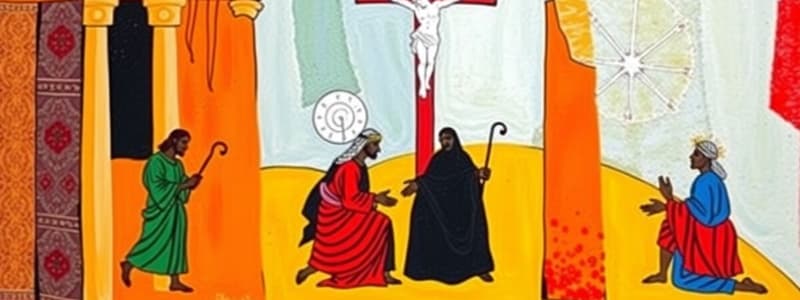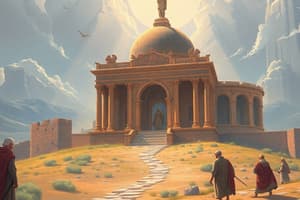Podcast
Questions and Answers
What event is referred to as the Resurrection in Christianity?
What event is referred to as the Resurrection in Christianity?
- Jesus's final meal with his disciples
- Jesus's crucifixion
- Jesus rising from the dead (correct)
- Judas betraying Jesus
Christians were initially embraced by Roman society without any challenges.
Christians were initially embraced by Roman society without any challenges.
False (B)
Who was the Roman governor that ordered the execution of Jesus?
Who was the Roman governor that ordered the execution of Jesus?
Pontius Pilate
According to Christian beliefs, after Jesus was buried, he rose from the dead on the _____ day.
According to Christian beliefs, after Jesus was buried, he rose from the dead on the _____ day.
Match the following events to their descriptions:
Match the following events to their descriptions:
Which emperor declared Christianity the official religion of the Roman Empire?
Which emperor declared Christianity the official religion of the Roman Empire?
What event caused Emperor Constantine to favor Christianity?
What event caused Emperor Constantine to favor Christianity?
Christianity began in Judea, which was part of the ancient kingdom of Israel.
Christianity began in Judea, which was part of the ancient kingdom of Israel.
What was Jesus sentenced to death by?
What was Jesus sentenced to death by?
By 380 C.E., Christianity was the official religion of the __________.
By 380 C.E., Christianity was the official religion of the __________.
Why did some Romans perceive Christianity as a threat?
Why did some Romans perceive Christianity as a threat?
The Battle of Milvian Bridge resulted in a defeat for Constantine.
The Battle of Milvian Bridge resulted in a defeat for Constantine.
Who were appointed to govern Judea under Roman rule?
Who were appointed to govern Judea under Roman rule?
The first two letters of the word Christ were used by Constantine's soldiers on their __________.
The first two letters of the word Christ were used by Constantine's soldiers on their __________.
Match the following terms with their descriptions:
Match the following terms with their descriptions:
Who was appointed as the king of Judea in 37 B.C.E.?
Who was appointed as the king of Judea in 37 B.C.E.?
Herod was well-respected by all Jews during his reign.
Herod was well-respected by all Jews during his reign.
What did the Jews believe would one day come to restore the kingdom of David?
What did the Jews believe would one day come to restore the kingdom of David?
Jesus was born in ________.
Jesus was born in ________.
What was the name of Jesus's mother?
What was the name of Jesus's mother?
Jesus's teachings emphasized love and mercy.
Jesus's teachings emphasized love and mercy.
Who recognized Jesus as the Messiah?
Who recognized Jesus as the Messiah?
Jesus began preaching in ________, which is present-day Israel.
Jesus began preaching in ________, which is present-day Israel.
Match the following Gospel writers with their names:
Match the following Gospel writers with their names:
What event is celebrated during the Jewish festival of Passover?
What event is celebrated during the Jewish festival of Passover?
Flashcards are hidden until you start studying
Study Notes
Origins of Christianity
- Christianity originated in Judea, a Roman territory at the eastern end of the Mediterranean Sea.
- Judea was once ruled by King David and King Solomon as part of the ancient kingdom of Israel.
- Jews in Judea were devoted to their homeland and belief in one God, distinguishing them from their neighbors.
- Judea came under Roman rule in 63 B.C.E and faced several Jewish rebellions against Roman control.
- Herod, appointed King of Judea in 37 B.C.E., was not Jewish by birth but embraced the religion and rebuilt the Temple of Jerusalem.
- Herod's death in 4 B.C.E led to unrest and division of his kingdom among his sons.
- Rome eventually sent soldiers to regain control and replaced Herod's sons with a military governor.
- The military governor enforced order and ensured taxes were paid to Rome, often leaving local affairs to Jewish leaders.
- A council of Jewish leaders governed Jerusalem, headed by a high priest.
- Despite outward peace, many Jews despised the Romans.
- Jewish sacred writings prophesied the arrival of a Messiah to restore the kingdom of David.
The Birth of Jesus
- Jesus's birth date is uncertain, though modern calendars mark the start of the Common Era from his supposed birth year.
- Historical records suggest Jesus's birth occurred around 6 B.C.E., during Herod's reign.
- Primary information about Jesus comes from the writings of his followers, composing the New Testament of the Christian Bible.
- The New Testament includes four Gospels, accounts of Jesus's life written in Greek years after his death, attributed to Matthew, Mark, Luke, and John.
- The Gospel of Luke describes Jesus's birth in Nazareth, Galilee, where an angel told Mary she would have a child named Jesus.
- A Roman census ordered by Emperor Augustus prompted Joseph, Mary's husband, to travel from Nazareth to his hometown of Bethlehem, in Judea.
- Mary gave birth to Jesus in Bethlehem, and the family later returned to Nazareth.
- The New Testament offers limited information on Jesus's childhood, he likely grew up in Nazareth and learned carpentry.
- At 12 years old, Jesus impressed rabbis at the Temple of Jerusalem with his wisdom and knowledge of Jewish law.
- At around 30, John the Baptist identified Jesus as the Messiah.
The Life and Death of Jesus
- Jesus began preaching in Galilee after 40 days of prayer in the wilderness.
- He preached in synagogues and open spaces, drawing large gatherings.
- Jesus chose a small group of disciples, primarily laborers and fishermen, who were closer to the poor and sick than the wealthy and powerful.
- Jesus's teachings were based on Jewish beliefs but emphasized love and mercy.
- The two most important laws according to Jesus were: "You shall love the LORD your God with all your heart and all your soul" and "You shall love your neighbor as yourself."
- Jesus proclaimed the coming of the Kingdom of God, not as an earthly kingdom of power and riches, but a time of living according to God's will.
- Jesus taught through parables, simple stories with moral or religious messages.
- The Parable of the Good Samaritan portrays an outsider as a true neighbor through compassion and help to a traveler in need.
- Jesus didn't directly preach revolt against the Romans, but some Judeans feared his growing following would cause trouble.
- Jesus went to Jerusalem for Passover, facing potential Roman unrest, and warned his disciples of his impending death.
- Judas betrayed Jesus, leading to his arrest and eventual execution by crucifixion.
- Jesus's final meal with his disciples is referred to as the Last Supper.
- The Roman governor of Judea, Pontius Pilate, ordered Jesus's execution by crucifixion, a common form of execution in Roman times.
- Jesus was crucified on a hill outside Jerusalem, between two other condemned men.
- His body was buried in a tomb after being removed by faithful followers.
The Resurrection and Spread of Christianity
- Three days after his burial, Jesus rose from the dead, appearing to his disciples, an event known as the Resurrection.
- Belief in the Resurrection solidified Jesus's disciples' belief in him as the Son of God.
- Jesus left his disciples to join his Father, God, in heaven.
- Jesus's disciples began spreading his teachings, attracting attention from the Romans.
- Christian preachers traveled throughout the Roman Empire, gaining converts.
- Paul and Peter, a close friend of Jesus, preached in Rome.
- Initial Roman tolerance towards Christians shifted as they refused to worship Roman gods and the emperor.
- Christians were seen as a threat to Roman order and patriotism, leading to their persecution and being declared illegal.
- Christians faced severe punishments, including crucifixion, burning, and being devoured by wild animals.
- Despite persecution, brave Christians faced death, gaining new followers through their unwavering faith.
- Christianity offered hope and purpose for those in the empire, especially the poor and enslaved.
- By 300 C.E., millions of Christians inhabited the Roman lands of Europe, North Africa, and western Asia.
- Christian communities expanded beyond the Mediterranean, reaching Persia and Central Asia.
- Emperor Constantine's victory in battle, attributed to a vision of a cross, led him to favor Christianity.
- The Edict of Milan, issued in 313 C.E., granted Christians religious freedom.
- Successive emperors embraced Christianity.
- Emperor Theodosius I banned pagan sacrifices, ultimately leading to Christianity becoming the official religion of the Roman Empire by 380 C.E.
Studying That Suits You
Use AI to generate personalized quizzes and flashcards to suit your learning preferences.




